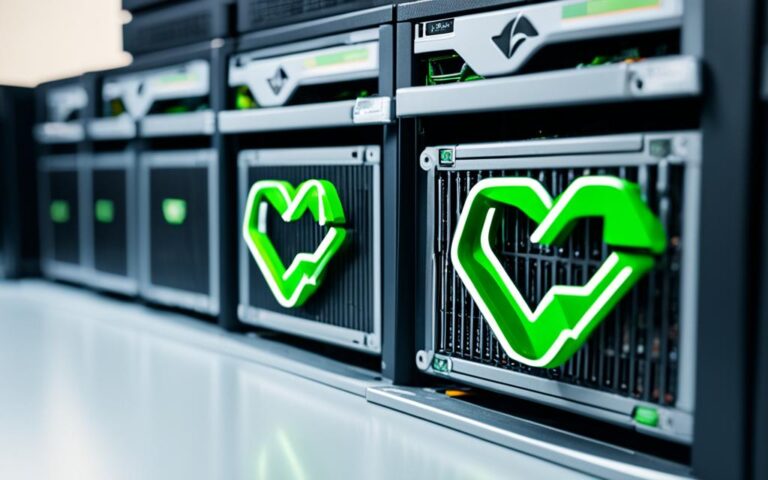The Impact of Server Recycling on Corporate Green Initiatives
In today’s digital age, businesses rely heavily on servers and other electronic equipment to drive their operations and store valuable data. However, as technology evolves at a rapid pace, these devices quickly become outdated, resulting in a constant need for upgrades and replacements. This leads to a significant environmental challenge – electronic waste, or e-waste.
E-waste poses a serious threat to our environment, contributing to pollution, resource depletion, and ecological damage. As responsible corporate citizens, it is crucial for businesses to take proactive steps towards reducing their environmental footprint and adopting sustainable practices. One such practice is server recycling, which plays a pivotal role in corporate green initiatives.
Environmental Impact and Sustainability of Server Recycling
Server recycling plays a vital role in promoting environmental sustainability by preventing the hazardous impact of electronic waste on the soil, water, and air. Through the process of recycling servers and other electronic equipment, we can mitigate the release of harmful materials and contribute to a cleaner and healthier environment.
By recycling servers, we enable the recovery and reuse of valuable materials, reducing the need for new resource extraction and energy-intensive manufacturing processes. This not only conserves natural resources but also helps to minimize the carbon footprint associated with the production of new equipment.
Furthermore, the practice of server recycling actively contributes to the reduction of e-waste, which is a significant environmental challenge worldwide. E-waste contains toxic substances that can contaminate the environment if not properly managed. By recycling servers, we play our part in tackling this issue and reducing the environmental impact caused by the disposal of electronic equipment.
“Recycling servers and other electronic equipment actively contributes to reducing e-waste and promoting a circular economy.”
Through the principles of a circular economy, server recycling ensures that materials are recovered and reintroduced into the production cycle. This approach reduces the strain on natural resources and minimizes waste generation. By keeping valuable resources in use for as long as possible, we strive towards a sustainable future and a more responsible use of our planet’s finite resources.
The Benefits of Server Recycling:
- Promotes environmental sustainability by preventing hazardous material contamination
- Reduces the need for new resource extraction
- Minimizes energy-intensive manufacturing processes
- Contributes to the reduction of e-waste
- Fosters a circular economy by recovering and reusing valuable resources
Server recycling is not only a responsible choice but also a necessity in the pursuit of a greener and more sustainable future. The positive impact it has on our environment cannot be understated, and every effort we make towards proper disposal and recycling of servers brings us closer to achieving a more sustainable world.
| Environmental Impact | Sustainability | Server Recycling |
|---|---|---|
| Prevents hazardous material contamination | Reduces the need for new resource extraction | Contributes to the reduction of e-waste |
| Minimizes energy-intensive manufacturing processes | Fosters a circular economy | Enables the recovery of valuable resources |
Data Security and Protection in Server Recycling
Data security is of utmost importance when it comes to server recycling. The proper disposal of servers ensures that sensitive data stored on these devices is adequately protected. At UCS Logistics, we understand the criticality of data protection in the server recycling process.
“Proper disposal of servers ensures that sensitive data stored on these devices is adequately protected.”
To safeguard sensitive information and minimize the risk of data breaches, privacy violations, and legal ramifications, we employ stringent data destruction techniques. Our comprehensive approach includes both secure erasure and physical destruction methods, ensuring that data is irrecoverable.
“Our comprehensive data destruction techniques safeguard sensitive information and minimize the risk of data breaches.”
Secure erasure involves the complete removal of data from the server’s storage media using industry-leading software and algorithms. This technique ensures that no traces of the original data remain, providing a high level of data security.
In cases where secure erasure is not feasible or preferred, physical destruction is employed. This involves physically dismantling the servers and destroying their components, rendering the data completely inaccessible.
“Our physical destruction methods ensure that data is irrecoverable.”
By implementing these robust data destruction techniques, UCS Logistics ensures that sensitive information is permanently removed from the servers before they are recycled or disposed of. This not only mitigates the risk of data breaches and privacy violations but also helps organizations comply with data protection regulations and industry-specific requirements.
The Impact of Data Security on Environmental Sustainability
Data security and protection are inseparable from the broader goal of environmental sustainability in server recycling. Ensuring data privacy and preventing unauthorized access to sensitive information contributes to maintaining public trust and protecting brand reputation.
By prioritizing data security in the server recycling process, organizations demonstrate their commitment to responsible IT asset management and contribute to a more sustainable future.
With increased public awareness of data breaches and privacy concerns, customers, investors, and stakeholders are increasingly demanding transparent and secure data handling practices. By partnering with UCS Logistics for server recycling, businesses can provide assurances regarding the protection of sensitive data and align with the expectations of their stakeholders.
Regulatory Compliance in Server Recycling
Businesses operating in today’s digital landscape must navigate a complex web of regulations and industry-specific requirements when it comes to IT asset management and server recycling. To ensure regulatory compliance, businesses need a comprehensive understanding of the laws governing server disposal and must implement processes that align with these regulations.
The Importance of Regulatory Compliance
Regulatory compliance in server recycling is not just about avoiding fines and penalties. It goes beyond financial considerations and extends to reputational damage which can have far-reaching consequences for a business. By prioritizing regulatory compliance, companies demonstrate their commitment to ethical and sustainable practices, fostering trust among stakeholders and enhancing their brand reputation.
One company at the forefront of ensuring regulatory compliance in server recycling is UCS Logistics. With years of experience in IT asset management, UCS Logistics has developed robust protocols and processes that enable businesses to adhere to applicable regulations and industry standards.
Navigating Complexity with Expertise
The landscape of server recycling regulations can be intricate, with different requirements varying across jurisdictions and industries. Businesses need a knowledgeable partner like UCS Logistics to guide them through the complexities and help implement compliant solutions.
UCS Logistics provides businesses with the expertise needed to navigate regulatory compliance in server recycling. Their team of professionals stays up to date with the latest regulations and works closely with clients to ensure compliance at every stage of the server disposal process.
Benefits of Compliance
Complying with regulations in server recycling brings numerous benefits for businesses. Firstly, it reduces the risk of fines and penalties associated with non-compliance. By avoiding legal repercussions, businesses can allocate resources more effectively toward growth and innovation.
Secondly, compliance promotes responsible environmental practices. By following regulations, businesses contribute to a sustainable future by preventing harmful substances from entering the environment, conserving natural resources, and reducing electronic waste.
Lastly, compliance with server recycling regulations instills confidence in customers, partners, and shareholders. It demonstrates a commitment to ethical operations and positions businesses as responsible corporate citizens.
Optimization of IT Investments and Cost Efficiency through Server Recycling
Server recycling plays a crucial role in helping businesses optimize their IT investments and enhance cost efficiency. Outdated or underutilized servers not only occupy valuable space but also require ongoing maintenance, which can become a financial burden. By adopting server recycling practices, businesses can unlock several benefits that contribute to their overall financial sustainability and growth.
Firstly, recycling servers allows businesses to free up physical space within their IT infrastructure. This space can then be repurposed for other essential equipment or operations, maximizing the utilization of available resources. By eliminating the need for additional physical space, businesses can avoid unnecessary investments in expanding their infrastructure, thereby optimizing their IT investments.
Secondly, server recycling reduces maintenance expenses. Outdated servers often require regular maintenance and repairs, which can be costly over time. By recycling these servers and replacing them with newer, more efficient models, businesses can significantly reduce their maintenance costs. This reduction in expenses can be channeled towards other strategic initiatives and investments that drive innovation and productivity.
Lastly, server recycling helps businesses eliminate unnecessary costs associated with outdated technology. Older servers may consume more energy, resulting in higher utility bills. By recycling these servers and adopting energy-efficient alternatives, businesses can lower their energy consumption and reduce costs in the long run. Additionally, recycling allows for the recovery and reuse of valuable materials from decommissioned servers, reducing the need for new resource extraction and manufacturing processes, which can be resource-intensive and expensive.
The following table provides a comparison between the costs of maintaining outdated servers versus the potential savings achieved through server recycling:
| Costs | Outdated Servers | Server Recycling Savings |
|---|---|---|
| Physical Space | Occupies valuable space within the infrastructure. | Frees up space for other essential operations. |
| Maintenance Expenses | Regular maintenance and repairs are required. | Reduces maintenance costs through the adoption of newer, more efficient servers. |
| Energy Consumption | May consume more energy, resulting in higher utility bills. | Lower energy consumption through the use of energy-efficient alternatives. |
| Resource Utilization | No contribution to resource conservation. | Contributes to the circular economy by reducing the need for new resource extraction and manufacturing. |
| Total Cost Savings | – | Significant cost savings achieved through optimized IT investments and improved cost efficiency. |
By recycling servers, businesses can unlock significant cost savings, enhance their overall IT investments, and promote a greener and more sustainable future.
Through server recycling, businesses can reallocate resources more effectively, focusing on technologies that drive productivity and innovation. By optimizing IT investments and improving cost efficiency, businesses can not only reduce financial burdens but also contribute to a more sustainable and environmentally conscious approach to IT asset management.
Next, we will explore the broader importance of recycling in business and its impact on electronic waste management. Stay tuned.
The Importance of Recycling in Business
Recycling plays a vital role in business operations, providing numerous benefits for both organizations and the environment. By collecting, processing, and reusing materials, businesses can reduce waste and minimize their environmental impact. In the realm of IT asset management, recycling is particularly significant, as it involves the responsible disposal and repurposing of electronic equipment, such as servers, to contribute to sustainability efforts, comply with environmental regulations, and optimize resource utilization.
The Environmental Advantage
By incorporating recycling practices into their operations, businesses can significantly reduce their carbon footprint. Electronic waste, or e-waste, is a growing concern due to its harmful impact on the environment. Recycling electronic equipment ensures that valuable materials, including metals and plastics, are reclaimed instead of ending up in landfills. Furthermore, recycling saves resources by reducing the need for raw material extraction and energy-intensive manufacturing processes. This approach not only benefits the environment but also helps businesses align with their corporate social responsibility objectives.
The Economic Benefits
Embracing recycling as a core business practice brings economic advantages as well. By responsibly disposing of outdated or unused electronic equipment, businesses can free up valuable physical space and reduce maintenance costs. This optimization of resources allows organizations to focus their financial investments on technologies and assets that drive productivity and innovation. Moreover, by demonstrating a commitment to sustainability, businesses can enhance their brand reputation, attract environmentally conscious customers, and gain a competitive edge in the market.
“Recycling turns things into other things, which is like magic.” – Unknown
Creating a Circular Economy
Recycling in business contributes to the development of a circular economy, where resources are utilized efficiently and waste is minimized. Rather than following a linear model of production and disposal, a circular economy focuses on keeping materials in use for as long as possible through recycling and repurposing. This shift in approach is essential for businesses to reduce reliance on new resource extraction, conserve natural resources, and promote a sustainable future.
| Benefits of Recycling in Business | Environmental | Economic | Social |
|---|---|---|---|
| Reduces carbon footprint | Optimizes resource utilization | Enhances brand reputation | Promotes sustainability |
| Prevents e-waste pollution | Reduces raw material extraction | Attracts environmentally conscious customers | Drives the circular economy |
| Conserves natural resources | Minimizes energy-intensive manufacturing | Reduces maintenance costs | Creates a sustainable future |
Through recycling, businesses can contribute to a greener future while reaping the benefits of environmental, economic, and social sustainability. By incorporating recycling practices into their operations, organizations play a crucial role in mitigating the negative impacts of electronic waste and shaping a more sustainable business landscape.
Conclusion
Sustainable e-waste management plays a critical role in safeguarding our environment, creating new avenues for economic growth, and fostering healthier communities. By embracing the principles of reduce, reuse, and recycle, we can minimize the environmental impact of electronic waste and maximize the utilization of valuable resources. However, there are several challenges that must be addressed to ensure the success of these initiatives.
One of the major obstacles is the complexity of electronic products, which often contain a diverse range of components that require specialized recycling processes. Additionally, there is a need for investment in infrastructure and facilities to facilitate efficient e-waste collection and processing. Furthermore, raising awareness among individuals and businesses about the importance of responsible e-waste management is vital.
The future of sustainable e-waste management lies in the development of technological innovations, the promotion of corporate responsibility, and collaborative efforts between businesses, institutions, and governments. By embracing cutting-edge technologies, such as advanced recycling techniques and sustainable materials, we can transform the e-waste management landscape. Moreover, it is crucial for businesses to take ownership of their electronic waste, implementing policies and practices that prioritize sustainability.
Collective action is key to shaping a future where sustainable e-waste management is the norm. By working together, we can build a more sustainable and resilient society, preserving our planet for future generations. Let us forge a path towards a future where e-waste is not a burden, but a valuable resource that fuels innovation, economic growth, and environmental stewardship.
FAQ
What is server recycling?
Server recycling is the responsible disposal and repurposing of servers and other electronic equipment to contribute to sustainability efforts, comply with environmental regulations, and optimize resource utilization.
Why is server recycling important for businesses?
Server recycling is essential for businesses as it helps contribute to environmental sustainability by preventing hazardous substances from entering the environment, conserving natural resources, and reducing e-waste. It also ensures data security and protection, compliance with regulations, and optimization of IT investments and cost efficiency.
How does server recycling contribute to environmental sustainability?
Server recycling significantly contributes to environmental sustainability by preventing hazardous materials from contaminating the soil, water, and air. It allows for the recovery and reuse of materials, reducing the need for new resource extraction and energy-intensive manufacturing processes. Recycling servers actively reduces e-waste and promotes a circular economy.
How does server recycling ensure data security and protection?
Proper disposal of servers ensures that sensitive data stored on these devices are adequately protected. UCS Logistics employs stringent data destruction techniques, including secure erasure and physical destruction, to safeguard sensitive information and minimize the risk of data breaches, privacy violations, and legal ramifications.
Are there any regulations businesses need to comply with regarding server recycling?
Yes, businesses are subject to various regulations and industry-specific requirements regarding IT asset management and server recycling. Failure to comply with these regulations can result in fines, penalties, and reputational damage. UCS Logistics ensures compliance with applicable regulations and industry standards, allowing businesses to navigate the complexities of server disposal while mitigating potential risks.
How does server recycling optimize IT investments and cost efficiency?
Outdated or underutilized servers occupy valuable space, require maintenance, and can become financial burdens. Recycling servers allows businesses to free up physical space, reduce maintenance expenses, and eliminate unnecessary costs. This optimization of IT investments allows organizations to allocate resources more effectively and focus on technologies that drive productivity and innovation.
What is the importance of recycling in business?
Recycling in business involves collecting, processing, and reusing materials to reduce waste and minimize environmental impact. In IT asset management, recycling encompasses the responsible disposal and repurposing of electronic equipment to contribute to sustainability efforts, comply with environmental regulations, and optimize resource utilization.
Why is sustainable e-waste management crucial?
Sustainable e-waste management is crucial for protecting the environment, creating economic opportunities, and building a healthier society. Implementing the 3 Rs of reduce, reuse, and recycle in e-waste management can help minimize environmental harm and maximize resource utilization. However, challenges such as product complexity, lack of infrastructure, and lack of awareness need to be addressed. Technological innovations, corporate responsibility, and collaboration between businesses, institutions, and governments will shape the future of sustainable e-waste management.















